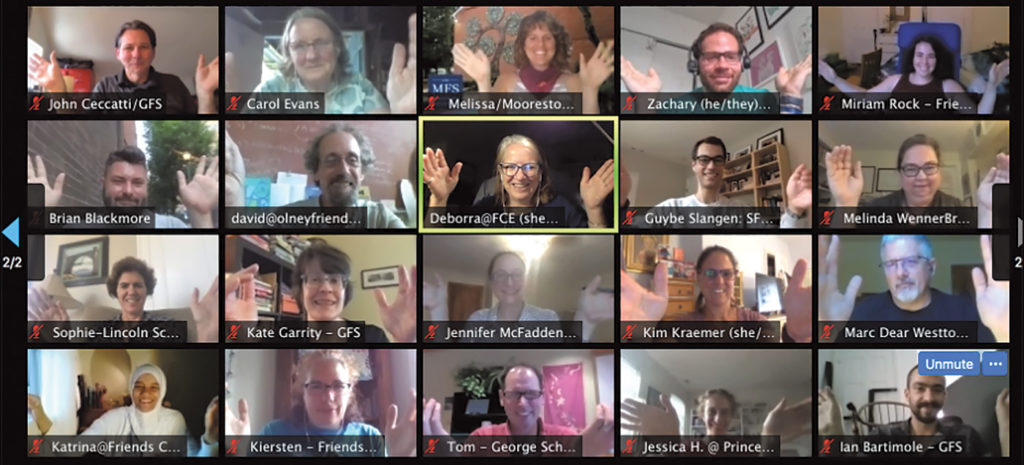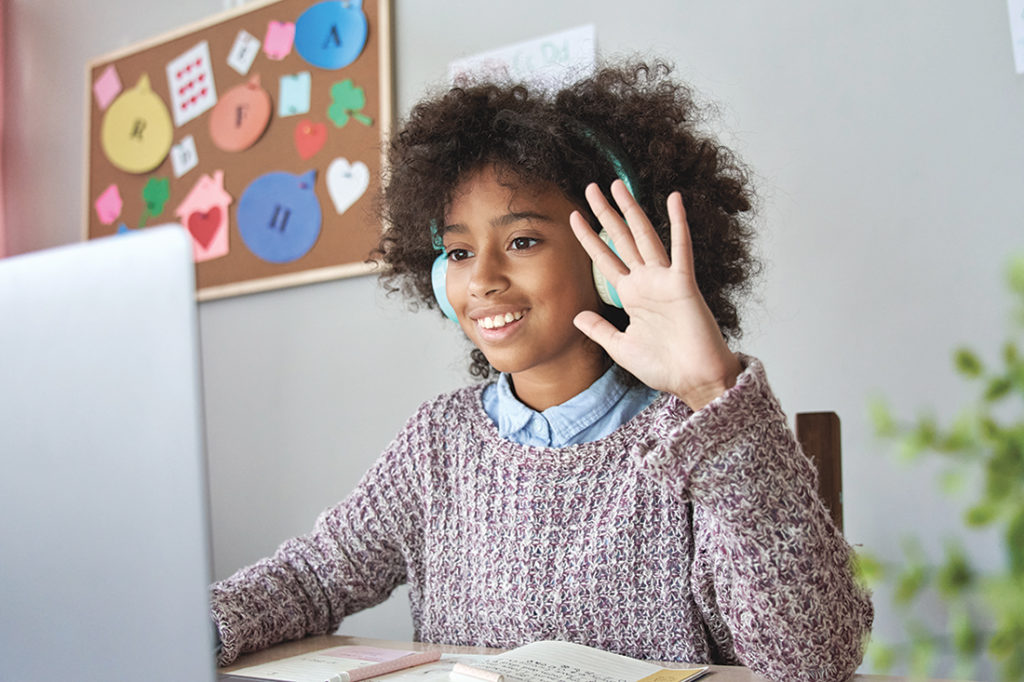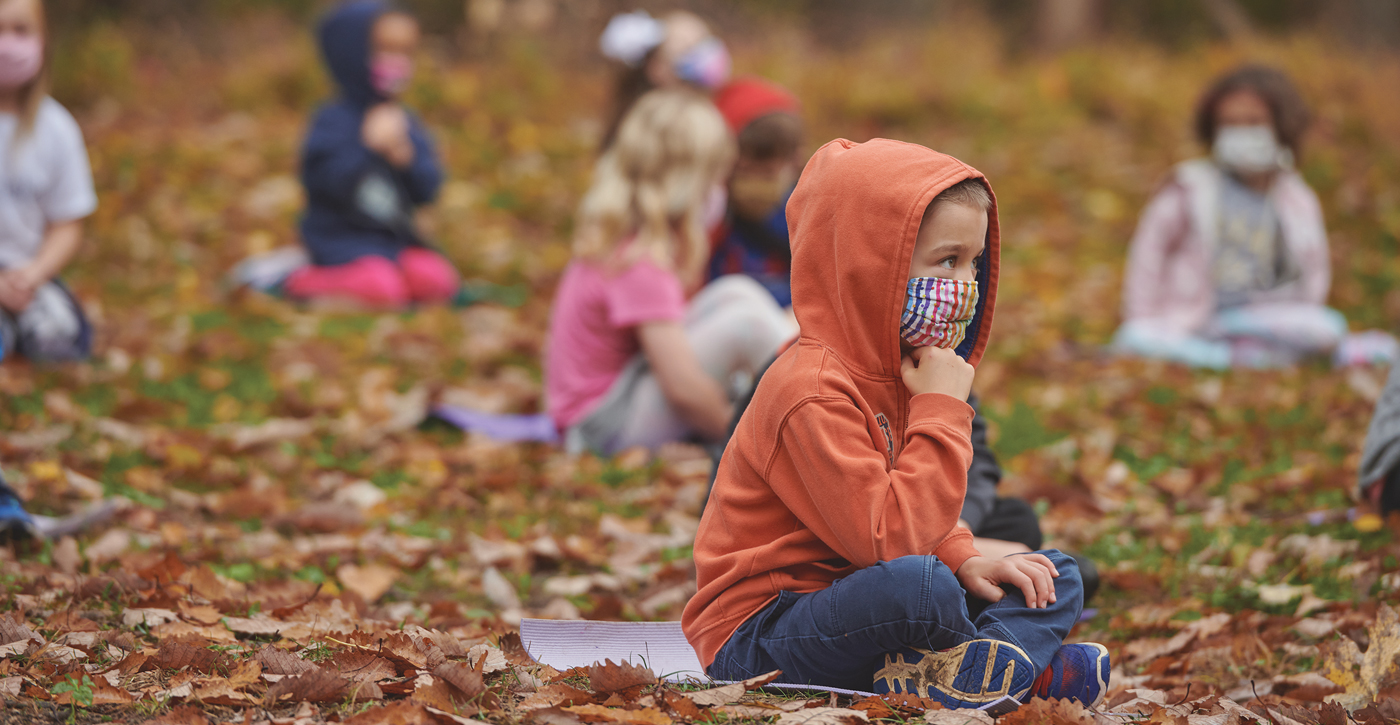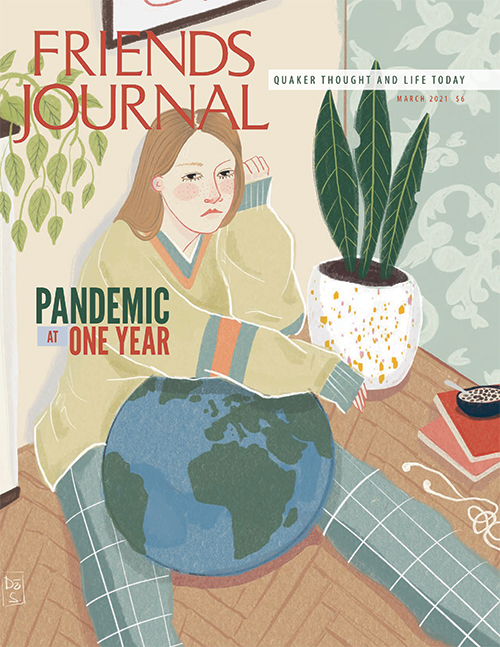Schooling through the Pandemic
What lessons have we learned in the past year about the fragility of our lives and our ability to adapt?
Looking at this query through the lens of our society’s education system, we are seeing how critically important in-person school is for children, families, and the economy. When schools are disrupted, the whole system is affected.
Friends education has always been grounded in matters of the Spirit; the practice of worship has long been central to school life. Friends school communities find comfort and direction by turning to worship at difficult times. In 2020, the COVID-19 pandemic and moving toward racial justice have been extensive challenges.
The pandemic has had a dramatic impact on those served by Friends Council on Education: educators, administrators, and boards in Friends schools across the country. In March 2020, as Friends schools pivoted from in-person to virtual schooling, Friends Council expanded its reach, became more adept at video conferencing, and offered more ways to support Friends school educators. Educators barely got a summer break as they planned multiple scenarios for a fall 2020 semester of toggling back and forth between in-person, hybrid, and virtual learning. Surrounded by the intensity of needs and uncertainty of schooling, Friends Council focused on its central purposes: maintain a strong network of educators in Quaker schools, help ground their work in matters of the Spirit through Quaker practices, and explore more deeply the matters of inequity and racial justice that the pandemic has laid bare.
Friends school educators and administrators turn to Friends Council on Education as they seek to draw on Quaker principles and practices as a way to bring individuals and school communities back to a spiritual center. We are witnessing the grounding nature of Friends spiritual practices as a central way that educators and families cope with and thrive under difficult circumstances. Schools partner with Friends Council as they explore questions such as the following: How does one hold meeting for worship online? What does service learning look like when in-person activities are not possible? What is the Quaker way of leading through disruption? How do we apply a Quaker lens to distance learning? What in each school’s Quaker nature is being lifted up during this time of disruption?

“Holding hands” at the close of online worship of the Quaker and spiritual life educator think tank.
Four Key Learnings and Responses
1. Friends Council’s weekly meetings for worship provide important connections for the broader Friends school community.
Early on in the pandemic, Friends Council initiated virtual weekly meetings for worship as a way to gather together and create connection and belonging. The first meeting for worship attracted over 100 people, so many that Friends Council had to expand its Zoom capacity to 500 to welcome all who wanted to attend. We found ourselves regularly connected to Friends school educators from across the country in Ohio, North Carolina, New York, California, and other states. We heard gratitude from those who were attending:
I recently moved and have been looking in my new neighborhood for a Quaker meeting to attend. This group feels like my home meeting—my group, my tribe.
—Jane Fremon, retired Friends school head
Friends Council is offering the gift of weekly meetings for worship on Wednesday afternoons. If you haven’t given yourself the gift, please do. It is very nurturing and fulfilling.
—Betsy Swan, librarian, Westtown School near West Chester, Pa.
I am so grateful for the weekly gatherings of Friends school heads and the weekly meetings for worship hosted by Friends Council. These are restorative and truly keep me grounded. Best of all, they don’t feel like just another Zoom meeting. They feel essential. I want to attend!
—Brenda Crawley, head of Plymouth Meeting Friends School in Plymouth Meeting, Pa., and Friends Council Board member
We’ve learned that Friends Council’s weekly virtual meetings for worship are providing a key spiritual connecting space for several groups. Current educators in Friends schools are finding space and time for a different kind of worship from what may be occurring with young people in their school communities. Heads of schools appreciate a designated time in their week for spiritual grounding and reflection. Retired Friends school educators, who share experience in and passion for Quaker education and who previously attended weekly meetings for worship in their schools, now can worship regularly with others in Friends education. Former trustees and Friends school alumni also attend. Our broader community is connected by working in Friends schools and engaging in the spiritual practice that is at their heart.
2. Virtual meetings for worship for a Friends school’s teachers, students, and families are helping to build and maintain a sense of community.
In Friends schools, meeting for worship is a weekly practice for students and faculty to sit together as a community in reflective silence, a silence that may be enriched when someone shares a thought or message.
Spiritual Life and Quakerism Coordinators at Friends schools were among the first to reach out to Friends Council for support in convening and leading meeting for worship in a virtual setting. As schools closed in-person gatherings, these educators struggled to find ways to help young people enter into a silent, reflective space on Zoom and make meaning of their experiences. Some students and adults who are new to Quaker schools may not have ever attended meeting for worship and felt the spiritual energy of a room full of individuals in collective reflection. Educators who nurture worship and spiritual life have noticed that some young people were having difficulty feeling connected in virtual meetings for worship.
We have learned that students may need more direction, and a clerk or other appointed volunteer may need to provide help to young people to get settled and centered. We are trying new traditions such as asking students to extend their arms to the sides of their Zoom squares at the close of meeting, so as to engage in a virtual “shaking of hands” at the close of worship. Some schools have gathered on their grounds—participants masked and socially distant—for outdoor meetings for worship where students listen to birds and take in the beauty of trees, the rattle of leaves, and even the passing of automobiles.
Friends Council started a Google document for teachers to share guided worship examples and successes, such as finding a comfortable position for your body; making sure your posture is relaxed; giving special attention to your breathing; trying the box breathing technique to encourage slow, deep breaths; and using a query, song, poem, quote, or a piece of art to focus attention.
Examples of queries are: What Quaker testimony do you want to embody as you go about your day? In the midst of uncertainty, where do you find joy? What helps you become and stay calm, centered, and focused? How do you stay positive and optimistic at a time when people struggle to find happiness?
Whether in whole-school groups or in smaller groups by grade or advisories, students and faculty are learning new ways of nurturing the spiritual life in their Quaker schools.
3. Connecting communities of Friends school educators keeps Quaker principles and practices at the core of their work in this new virtual setting.
Having a network of educators in Quaker schools across the country provides a unique professional development that connects subject specialties with Quaker pedagogical principles grounded in Spirit and the Light within all.
For example, when lower school teachers came together for support and learning, they realized that checking in with and taking the emotional temperature of each student was most important. How can we teach children to read if they are worried and confused about “the COVID,” and their attention is on survival? How might teachers support parents as education partners helping their kids with online learning? In a time when every school day feels unnatural, we’re teaching teachers how to help children and adults be reflective and centered while on Zoom. Putting Quaker principles first helps teachers create a sense of community and care.
Performing arts professionals (instrumental and vocal music, theater, film, and dance) know that finding creative expression of Spirit and collective purpose is important, and our young people are hungry for creative outlets. In large and small groups, these talented professionals came together to brainstorm about adapting their programs for students when it’s not possible or safe to be physically present for lessons, rehearsals, and performances.
Deans came together to support one another, as did admission professionals and advancement staff. While focusing on core Quaker principles, each network group connects around unique tasks. In times when education is challenged or undergoes upheaval, Friends school educators turn to Friends Council for guidance and conversation with peers in other Friends schools.

Photo by insta_photos
4. Addressing racism and inequity in our society requires ongoing and collaborative work on all our parts.
The COVID-19 pandemic has drawn the world’s attention to inequity in our country, placing a glaring spotlight on what some are calling “the pandemic of racism.” Quaker school educators support one another in addressing issues of diversity, equity, and inclusion within their school communities and in their commitment to transforming the wider world.
Quaker school communities recognize the need to challenge structural racism; to raise awareness of White supremacy, as evidenced by police brutality, racial inequity in the U.S. healthcare system, and disparities in schools across the country; and to transform systems and counter injustice to support Black, Indigenous, and People of Color. This focus on racial justice work is not new for Friends school educators. Friends school mission statements testify to a collective commitment to greater diversity, equity, inclusion, and belonging. Many Friends schools have dedicated funding and faculty to direct this work, putting the words of their mission statements into action. Open to continuing revelation, this learning is continually evolving.
In the spring of 2020, Friends Council expanded its already existing diversity work by convening two forums on diversity, equity, and inclusion entitled “Quaker School Pathways toward Racial Justice: Awareness and Action—What Comes Next?” Over 150 educators from Quaker schools all over the country came together via Zoom. They shared powerful stories about how their own schools have responded to recent events of police brutality, inequity, and systemic racism. Teachers participated in race-alike affinity groups to consider queries and to ground racial justice work in Spirit.
As part of cities, towns, and neighborhoods, Friends schools emphasize community outreach as part of their missions. In partnership with educators in Friends schools, Friends Council has been reaching the wider community through convening Community Conversations on Race (CCOR). What started as a film screening of I’m Not Racist . . . Am I? at the Hiway Theater in Jenkintown, Pennsylvania, in the fall of 2017 has grown into regular gatherings of Friends school educators and community members who engage in often difficult and courageous conversations on race. This past year over Zoom, CCOR participants have been practicing how to interrupt and challenge racist behavior and comments. “UnColumbus Day” is a workshop through which Friends school and public school educators have come together the past several years to unlearn the myths and misconceptions about Native Americans, and to relearn new ways of teaching related U.S. national holidays, such as Columbus Day and Thanksgiving.
One Friends school educator shared the following reflection:
Quaker values are the foundation of our school communities, and fundamentally guide our thinking and acting in our classrooms, in our meetingrooms, in our playgrounds, and in our relations with parents, students, and each other. But what do equality and justice mean for us in our schools, particularly during this time of social unrest and social momentum? What does it feel like for those underrepresented or marginalized voices, in particular for Black voices and People of Color?
What does service learning look like when in-person activities are not possible?
What is the Quaker way of leading through disruption? How do we apply a Quaker lens to distance learning? What in each school’s Quaker nature is being lifted up during this time of disruption?
Working and learning in this pandemic has been a long, long haul for teachers, for the children they serve, for families, and for administrators at the helm. Friends Council’s connection and support of Friends schools across the country gives us a unique lens on what impact this pandemic has had.
During our weekly Zoom gatherings for heads of schools—large and small, K–12 and early childhood—we’ve seen amazing school leaders help lift each other up, as they’ve learned more about infectious disease than they could have imagined necessary, wrestling with such questions as: What medical information do we trust? How do we deal with infection rates in the community? What criteria do we use for schools being open or closed? How do we use Quaker process in making decisions about whether to be open or hybrid? What cleaning protocols and plexiglass barriers are needed? and Should the windows be open or closed?
On several occasions, as we looked at the faces of colleagues on Zoom, we noticed seasoned educators rubbing their foreheads to relieve tension. Others laid their heads down in exhaustion, their grief and turmoil obvious as they struggled with all these new problems. These Quaker school leaders care for their communities, and in these troubling times, they reach out to care for each other. As pandemic conditions change and vaccines become more available, we also witness their joy and anticipation of returning to in-person communities of care.
We’ve witnessed educators keeping their students at the center of their focus—even as they themselves struggle to balance work and family—working straight through the summer so that they could be well-prepared for the coming school year while navigating their own stress and uncertainty during this pandemic. Friends schools and Friends school educators are adapting; they are staying nimble, focusing on the health and safety of students and faculty, and using continuing revelation and other Quaker principles and practices to maintain community and reach for a transformed and equitable society. Meeting for worship and the spiritual foundations of FCE member schools provide a grounding, a touch stone to navigate through the COVID pandemic and act for racial justice.





thank you so much for the insight on just what our kids & their teachers have been going through
(and parents too)
……….peace & hope
Wonderful, thoughtful article. Thank you! I hope in the next one we could hear more about “grounded in Spirit and the Light within all” in Meeting for Worship. Perhaps even a mention of God, the worship and love of God, as well as Jesus Christ.